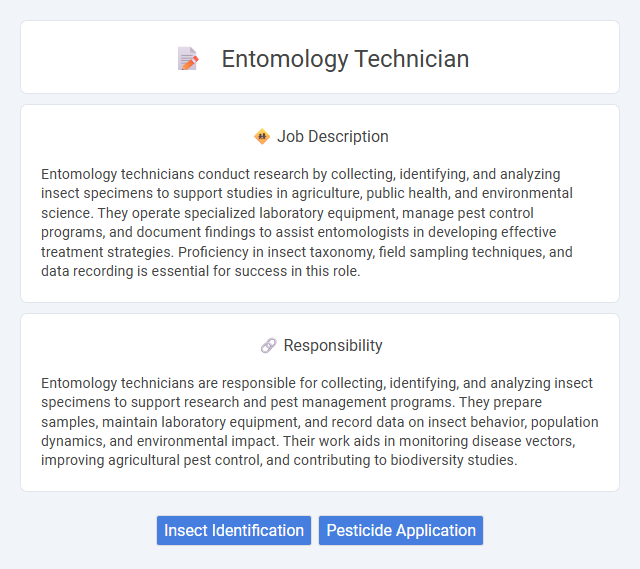
Entomology technicians conduct research by collecting, identifying, and analyzing insect specimens to support studies in agriculture, public health, and environmental science. They operate specialized laboratory equipment, manage pest control programs, and document findings to assist entomologists in developing effective treatment strategies. Proficiency in insect taxonomy, field sampling techniques, and data recording is essential for success in this role.
Individuals with strong attention to detail and a keen interest in insects and ecosystems are likely well-suited for an entomology technician role. Those who prefer outdoor work combined with laboratory analysis may find this career fulfilling, while people averse to handling specimens or conducting repetitive experiments might struggle. The job probably requires patience and resilience, making it more suitable for people comfortable with meticulous, scientific tasks.
Qualification
An Entomology Technician typically requires a minimum of an associate degree in entomology, biology, or a related field, with practical experience in insect identification and laboratory techniques highly valued. Proficiency in using microscopes, specimen collection tools, and data recording software is essential for accurate analysis and reporting. Certifications in pest management or specialized training in molecular biology techniques can enhance job prospects and effectiveness in research or applied entomology roles.
Responsibility
Entomology technicians are responsible for collecting, identifying, and analyzing insect specimens to support research and pest management programs. They prepare samples, maintain laboratory equipment, and record data on insect behavior, population dynamics, and environmental impact. Their work aids in monitoring disease vectors, improving agricultural pest control, and contributing to biodiversity studies.
Benefit
Working as an entomology technician likely offers benefits such as hands-on experience with insect identification and data collection, which can enhance skills valued in agriculture, environmental science, and pest control industries. This role probably provides opportunities to contribute to important research that impacts public health and ecosystem management. Employees may also enjoy collaborative work environments and access to specialized training that improve career advancement prospects.
Challenge
The role of an entomology technician likely involves navigating complex challenges such as identifying diverse insect species and analyzing their behaviors in varied environments. Managing large datasets from field samples may require meticulous attention to detail and advanced analytical skills. Problem-solving under unpredictable conditions and adapting to evolving scientific methodologies probably play crucial parts in daily responsibilities.
Career Advancement
Entomology technicians gain expertise in identifying insect species, monitoring populations, and supporting pest control strategies, which paves the way for career growth into research, laboratory management, or specialized pest management roles. Advanced certifications and a strong foundation in biological sciences enhance opportunities for leadership positions within agricultural, environmental, and public health sectors. Continuous skill development in molecular techniques and data analysis further accelerates advancement into entomological research or supervisory roles.
Key Terms
Insect Identification
Entomology technicians specializing in insect identification utilize advanced microscopy and molecular techniques to classify and catalog various insect species, supporting research and pest control initiatives. Their expertise in morphological analysis and genetic barcoding ensures precise differentiation among closely related species, critical for ecological studies and agricultural management. Proficiency in database management and field sampling protocols enhances the accuracy and efficiency of insect specimen documentation and reporting.
Pesticide Application
Entomology technicians specializing in pesticide application play a critical role in monitoring pest populations and implementing targeted control methods to protect crops and environments. They collect and analyze insect samples, determine appropriate pesticide types, and ensure applications comply with safety regulations and environmental standards. Expertise in integrated pest management (IPM) techniques enhances the effectiveness and sustainability of pesticide use in agricultural and urban settings.
 kuljobs.com
kuljobs.com